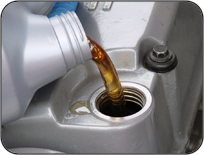 Motor oil is used in automobile and truck internal combustion engines as lubrication for the engine’s moving parts, to clean the engine, help prevent corrosion, improve the sealing properties of various elements in the engine and help cool the engine by carrying away heat from moving parts.
Motor oil is used in automobile and truck internal combustion engines as lubrication for the engine’s moving parts, to clean the engine, help prevent corrosion, improve the sealing properties of various elements in the engine and help cool the engine by carrying away heat from moving parts.
Motor oil is normally made from heavy, thick petroleum hydrocarbons found in crude oil. Some oils, however, are entirely synthetic (derived from mineral or non-mineral based oils) or a synthetic blend (or hydrocarbon-based oils and synthetic-based oils).
But which motor oil is best for your vehicle and what’s the difference between all the different types, weights and other options?
 First, you should always use the weight and type of motor oil as specified by your vehicle’s manufacturer as noted in your vehicle’s owner’s manual. Your vehicle’s engine has been designed to exact standards and to perform in a manner that is designed to give it a long life. Using the specified type of motor oil will help to extend the life of your vehicle’s engine and make sure everything performs to specifications.
First, you should always use the weight and type of motor oil as specified by your vehicle’s manufacturer as noted in your vehicle’s owner’s manual. Your vehicle’s engine has been designed to exact standards and to perform in a manner that is designed to give it a long life. Using the specified type of motor oil will help to extend the life of your vehicle’s engine and make sure everything performs to specifications.
On every bottle of motor oil, there are three pieces of information: the API service rating, the viscosity grade and the “Energy Conserving” indicator (the oil either is or it isn’t).
API service rating
This is a two-letter rating that tells you the type of engine the oil is designed for (i.e. gasoline or diesel) and the quality level. The “S” designation (standing for “service”) indicates oil suitable for typical passenger cars and light trucks featuring gasoline engines. The “C” designation (“commercial”) is usually suitable for diesel equipment. A newer API rating is “SN,” which indicates that is appropriate for gasoline automobile and light truck engines. There are other designations as well, but these are the major ones you might experience.
Viscosity grade
This is the somewhat bewildering combination of numbers and letters, such as 10W-30. It tells you the oil’s thickness or viscosity. A thinner motor oil — indicated by a lower number — flows more easily. Conversely, a thicker oil — with a larger number — is thick and resistant to flow. An oil’s viscosity needs to be high enough to maintain lubrication, but low enough that the oil can flow around the engine without any problems.
Viscosity grades of oil are designated (from low to high viscosity) by the numbers 0, 5, 10, 15, 20, 25, 30, 40, 50 and 60. Certain numbers — 0, 5, 10, 15 and 25 — might have the letter “W” after them, indicating they are “winter” or cold-start types of oil, designed to work at colder temperatures.
So what about the second number we sometimes see (e.g. 10W-30)?
Oils designated in this manner are multi-grade, meaning they meet the viscosity grading of both 10W- and 30-grade oil.
Fuel additives
Some oil manufacturers will add in chemicals that improve the oil’s viscosity. Other types of additives include detergents and dispersants to help keep the engine clean, corrosion inhibitors and other additives that protect metals in the engine and aid in minimizing wear and tear.
How often should I replace my oil?
The plain and simple answer is, per your vehicle’s manufacturer’s instructions, taking into account your driving habits, condition of your vehicle and the environment you typically drive in. The real-world ability of an oil to crank or pump when cold is potentially diminished soon after it is put into service and its ability to lubricate, clean the engine, and draw off heat steadily declines over time.
Some types of vehicles — mainly European models such as Volkswagens and Mercedes-Benz as well as more exotic brands such as Porsche, Peugeot and Citroen, may require specialty oils including those that are identified as “long life.” Again, your vehicle’s owner’s manual will give guidance here and it’s best to bring vehicles like this to a qualified service provider.
For more questions about motor oils and which one is right for your vehicle’s engine, your driving habits and the conditions you drive in, contact Bockman’s Auto Care at (815) 756-7413 or visit http://www.bockmansautocare.com/
category/maintenance/.







